Gag me: Does censuring the censors really work?
-
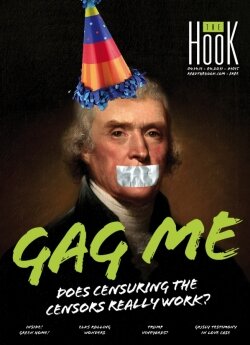
-
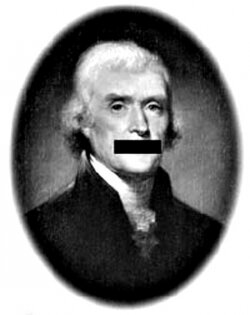 Muzzle winners get a t-shirt with a picture of Jefferson muzzled.THOMAS JEFFERSON CENTER FOR THE PROTECTION OF FREE EXPRESSION
Muzzle winners get a t-shirt with a picture of Jefferson muzzled.THOMAS JEFFERSON CENTER FOR THE PROTECTION OF FREE EXPRESSION -
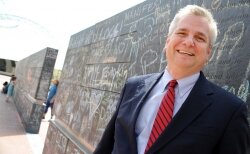 Josh Wheeler, likely successor to head the Thomas Jefferson Center, charts the trends in free speech violations over the Muzzle's 20 years.PHOTO BY JEN FARIELLO
Josh Wheeler, likely successor to head the Thomas Jefferson Center, charts the trends in free speech violations over the Muzzle's 20 years.PHOTO BY JEN FARIELLO -
 Fox commentator/TJ Center board member Brit Hume says the Muzzles are most effective on the local level.PHOTO COURTESY BRIT HUME
Fox commentator/TJ Center board member Brit Hume says the Muzzles are most effective on the local level.PHOTO COURTESY BRIT HUME -
 Sean Cudahy and Ellie Leech, past and current editors of Albemarle High's The Revolution, think school administrators deserve a Muzzle for confiscating the student paper.FILE PHOT BY LISA PROVENCE
Sean Cudahy and Ellie Leech, past and current editors of Albemarle High's The Revolution, think school administrators deserve a Muzzle for confiscating the student paper.FILE PHOT BY LISA PROVENCE -
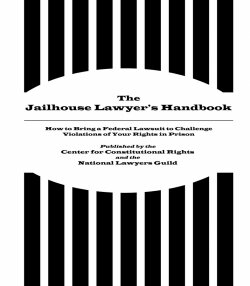 Virginia Department of Corrections claimed The Jailhouse Lawyer's Handbook was a threat to prison safety.PHOTO COURTESY NATIONAL LAWYERS GUILD
Virginia Department of Corrections claimed The Jailhouse Lawyer's Handbook was a threat to prison safety.PHOTO COURTESY NATIONAL LAWYERS GUILD -
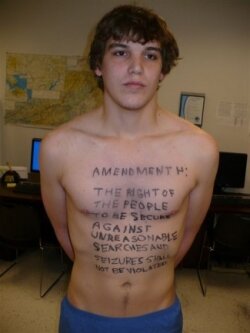 The TSA was not amused by Aaron Tobey's protest.PHOTO HENRICO POLICE
The TSA was not amused by Aaron Tobey's protest.PHOTO HENRICO POLICE -
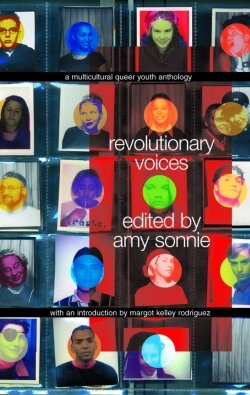 Revolutionary Voices did not get due process from a New Jersey Library system.PUBLICITY PHOTO
Revolutionary Voices did not get due process from a New Jersey Library system.PUBLICITY PHOTO -
 Dahlia Lithwick's favorite of this year's Muzzles combines violates the First and Fourth Amendments.FILE PHOTO BY JEN FARIELLO
Dahlia Lithwick's favorite of this year's Muzzles combines violates the First and Fourth Amendments.FILE PHOTO BY JEN FARIELLO -
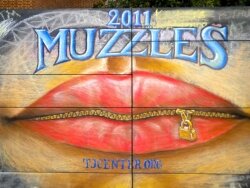 Artist Sam Welty takes to the Free Speech Wall.PHOTO BY JOSH WHEELER
Artist Sam Welty takes to the Free Speech Wall.PHOTO BY JOSH WHEELER
It's not surprising that in Thomas Jefferson's hometown, the founding father's ideals are so vaunted that a Free Speech Monument stands in front of City Hall for citizens to express themselves. Individuals may erase each other’s messages; city government may not.
So when a mother complained about a lewd drawing, and the Charlottesville city manager ordered it erased–- in violation of the terms of the slate wall's donor, the Thomas Jefferson Center for the Protection of Free Expression–- the obvious question for TJ watchers was whether the city manager would get the equivalent of the free speech walk of shame: a Jefferson Muzzle award.
The list of the most "egregious or ridiculous affronts to free expression" comes out every April 13 on Jefferson's birthday, and City Manager Maurice Jones can breathe a sigh of relief. He didn't make it–- but Albemarle High School administrators did, the second time the county school system has received this dubious distinction.
"That was a mistake [Jones] acknowledged very quickly and promised they won't do again," says Josh Wheeler, associate director at the Thomas Jefferson Center. Acknowledging a mistake can go a long way to mitigate a Muzzle, and besides, says Wheeler, "We've got a lot worse than that."
This year marks the 20th annual bestowing of Muzzles, and Robert O'Neil, the center's founder and director, can't remember exactly who came up with the plan to recognize free speech offenders. But the idea was one upon which board members as diverse as conservative columnist James Kilpatrick and former ACLU president Norman Dorsen agreed.
The might of the Muzzle, O'Neil believes, comes from the balance across the political spectrum of the Thomas Jefferson Center's board of trustees. For example, he cites Fox News commentator Brit Hume and Slate reporter Dahlia Lithwick, former Nancy Reagan press secretary Sheila Tate and DMB violinist Boyd Tinsley.
The common ground of board members, whether conservative or liberal, is free speech and its protection. "It's harmonious because of that natural balance," says O'Neil.
"There's more ideological diversity on this board than in most newsrooms," says Hume, and he says the board spent days debating the Muzzle nominees before picking the winners. "People tend to agree on free speech," he says.
And how effective are the Muzzles? Hume sees the award as a deterrent on the local level more than the national. "It's a negative thing to get an award for suppressing something America holds dear," he says. "I wouldn't want to get one."
"The value of a bit of public hectoring shouldn't be underestimated," says Lithwick, who's been on the center's board since 2006. "In general, I think that when folks know people are being vigilant about the suppression of speech, they think twice about what they do."
Another strength of the award, says O'Neil, is that violators fall throughout the political spectrum as well. In 2005, both the Democratic and Republican national parties got a Muzzle. "There are more than enough problems and transgressions to go around," he says.
And despite the public hectoring, there are repeat offenders. Former New York mayor Rudy Giuliani received a Lifetime Muzzle Award in 1999, as did the Federal Communications Commission in 2008.
During his second term in office, Giuliani racked up 12 First Amendment lawsuits brought by the ACLU, and he lost 11 of them. "He has stifled speech and press to so unprecedented a degree, and in so many and varied forms, that simply keeping up with the city’s censorious activity has proved a challenge for defenders of free expression," says the TJ Center. Among the violations, Giuliani ordered city buses not to run ads purchased by New York magazine that caricatured the mayor. "Unbelievable," says O'Neil.
Giuliani's office did not respond to a request for comment for this story, but Wheeler reports that Giuliani publicly has described the Thomas Jefferson Center as "an out-of-control advocacy organization."
Since the Muzzles were first handed out in 1992, thanks to the Internet, the number of nominees has grown from around 100 to more like 300, says Wheeler.
The center's staff whittles them down to around 25 to send to the board, with the goal of finding 10 solid nominees. That's not a hard and fast number, says Wheeler. Some years, more are warranted. Other years, there are fewer. "We won't artificially go to 10 if there are only nine," he says.
The center writes to the nominees and invites them to respond– and about half do. "Some do provide further evidence, enough that we don't feel a Muzzle is warranted," says Wheeler.
But just as often, the center gets another kind of response, one that begins with the alleged Muzzler voicing support for the First Amendment. "Then there's a 'but,'" says Wheeler, "and they're digging a deeper hole to justify their actions."
Over the years, Wheeler has seen trends in the trampling of free expression, for example, secondary schools punishing students for off-campus speech, which earned Connecticut school administrators who didn't take kindly to criticism posted on a social networking site a Muzzle in 2008.
"Since 2001, there's been much greater concern about national security, often to the neglect of First Amendment principles," says Wheeler. "There's been a resurgence of national pride to a degree that's troubling: If you don't agree with me, you're unpatriotic." One of this year's recipients is a judge who made the Pledge of Allegiance mandatory in his courtroom and jailed a lawyer who refused.
And some things never change. School administrators and school boards are perennials on the list.
"It appears both heroes and threats to free speech do not have common political origins," Wheeler says.
Muzzle winners get a t-shirt with a gagged Jefferson on the front. The speaker of the South Carolina House of Representatives, which earned a free-speech black eye in 2004 for passing a resolution that denounced the Dixie Chicks for criticizing President George Bush's impending invasion of Iraq, wanted t-shirts for the entire house, recalls Wheeler.
Other recipients have told him to stick the t-shirt where the sun don't shine, he adds.
Wheeler insists the defense of free speech is not a personal vilification of the Muzzle recipient. "We try to make clear we're not judging them as human beings," he says. "We're censuring them for their decisions in this particular context. Often they've made the decision with the best of intentions but neglected to give proper consideration to First Amendment principles."
And sometimes bestowing a Muzzle causes particular pain to the Thomas Jefferson Center for the Protection of Free Expression, like in 2008, when another Jeffersonian offspring, the 2007 managing board of the Cavalier Daily, received a Muzzle after it caved to public criticism about an editorial cartoon that had been approved and fired cartoonist Grant Woolard.
Cav Daily editor-in-chief Jason Ally wasn't around then, but he has heard about the flap, which included more than 200 students storming into the Cav Daily offices and decrying Woolard's cartoon, "Ethiopian Food Fight," as racist.
"The award itself didn't have an effect, but the whole experience did," Ally says. "We look at content more carefully now, especially cartoons."
The student paper is keen not to offend, and editors look at material from a racial, religious, gender, creed, and organizational viewpoint, says Ally.
"If we ever pulled something, we'd talk to [the writer]," he says.
He mentions an inflammatory situation he's dealt with– an op-ed column that criticized a Catholic politician. In this case, he says, the writer could have done more to back up his claims. "It's okay to have opinions, but you have to back them up," says Ally. "In no way did we need to throw the writer under the bus."
In contrast to his predecessor in 2008, who lashed out at the Thomas Jefferson Center for giving the Cav Daily a Muzzle because it was a student paper, Ally thinks the award has a place in a society that cherishes free speech.
"We're a learning newspaper, and we will make mistakes," he says. "We try to learn from that."
Will the recipients of the 2011 Muzzles learn from their mistakes? Well, let's just say that for the second year in a row, the Virginia Department of Corrections will be getting another t-shirt.
And the envelope, please.
The Virginia Department of Corrections for banning books–- again
It was only two years ago that the DOC raised an outcry when it banned inmates from receiving free books from Books Behind Bars, a 20-year-old nonprofit program founded by Quest Bookshop's Kay Allison. But that's not what got it a Muzzle in 2010–- that was for denying an inmate a Christian sermon recorded on a CD, while allowing music CDs.
So it's with alarming regularity that the Department of Corrections makes the Muzzle cut again, this time for denying prisoners access to a book–- The Jailhouse Lawyer's Handbook: How to Bring a Federal Lawsuit to Challenge Violations of Your Rights in Prison.
The prison system's publication review committee upheld the ban, calling the content of the self-help legal guide “detrimental" to offender rehabilitative efforts and the safety of prison staff and inmates.
"We hadn't encountered an entire state banning our book," says Alissa Hull with the National Lawyers Guild, which publishes the book and sends it free to inmates.
The Lawyers Guild and the Center for Constitutional Rights sued the Department of Corrections, which settled the lawsuit and agreed to allow inmates access to The Jailhouse Lawyer's Handbook.
"If you're a frequent recipient, you want to get off that short list," suggests Hull to the two-time Muzzle winner.
"The Virginia Department of Corrections faces a constant challenge to achieve a balance between safety and security of our facilities, employees, and offenders," says DOC spokesman Larry Traylor. "We are glad that the issues referenced by the Thomas Jefferson Center have been resolved to everyone’s satisfaction."
The TJ Center says it wishes Virginia's prison officials would give greater consideration to inmates’ First Amendment rights— without the intervention of a lawsuit.
Uh-oh. The Daily Progress reports April 8 that the DOC is being sued again by an inmate not allowed a poet Dylan Thomas CD.
Albemarle High School administration for destroying all copies of the school newspaper
The last issue of The Revolution already had been vetted by the faculty adviser and gone to press last May when the P.E. teachers raised a ruckus about an editorial that suggested the requirement that student athletes take gym classes was a waste of time.
School administrators listed a variety of reasons why the issue was seized and destroyed: P.E. teachers wouldn't have an opportunity to respond to the end-of-year op-ed piece, it would be disruptive, it would be unfair to the editorial's author, and typos.
The Student Press Law Center called the seizure unconstitutional, and offered to represent last year's editor, Sean Cudahy, and author Ellie Leech, who is The Revolution's editor this year. While the students didn't sue, the Thomas Jefferson Center says the AHS administration's censoring is worthy of censure–- and a Muzzle.
"The lesson taught to Albemarle High School students is that expression of their opinions is permitted only if they agree with the administration’s," says the TJ Center.
"I think it's definitely warranted," says Cudahy, now studying journalism at American University. "Their actions last spring were certainly stifling free speech."
For Cudahy, it wasn't just the censoring, but how the situation was handled–- "unprofessionally," he says–- that still rankles.
"They could have apologized," he says. "Everyone knew they were stifling free speech. But instead of taking the honorable route, they came up with excuses that weren't entirely true."
AHS principal Jay Thomas did not respond to a phone call from the Hook.
Leech was surprised at the amount of support for the students and for the First Amendment. "So many people run around without realizing what our rights are," she says. More troubling, she points to a March Newsweek poll that shows 38 percent of Americans would fail the citizenship test, and 44 percent can't identify the Bill of Rights.
Albemarle School Board chair Steve Koleszar also sees a learning experience from the school system's second Muzzle.
"Criticism helps you get better," he says. "School principals are charged with educating kids and keeping them safe. Sometime they make mistakes. You learn from it."
In 2002, a Jack Jouett Middle School assistant principal told then 13-year-old Alan Newsom to remove the t-shirt he was wearing from an NRA shooting camp he'd attended because it depicted men with guns, even though the mascot for neighboring Albemarle High is a musket-toting patriot. Newsom sued, and in 2004, Albemarle settled the case–- and earned its first Muzzle.
The censoring of the student paper has legs as a learning experience for Cudahy. In an introductory media class at American University, he presented articles on the episode and brought in his own first-hand free speech experience. "The teacher thought it was the most ridiculous thing she'd ever heard," he says. "The class felt like my First Amendment rights had been violated."
The Transportation Security Administration for causing the arrest of a topless passenger with the Fourth Amendment written on his chest
When the TSA unveiled full-body image scanners last year, a lot of airline passengers were outraged that their naked bodies would be on display, and that if they opted out of going through the scanners, they faced a more invasive security pat down. Charlottesville native Aaron Tobey was one of them.
Tobey, 21, decided to exercise his First Amendment right of peaceful protest by penning the Fourth Amendment's prohibition of “unreasonable searches and seizures” on his chest. Attempting to board a December 30 flight out of Richmond, at the security checkpoint conveyor belt, Tobey took off not only his shoes and belt, but his shirt and pants. Clad only in running shorts and the Fourth Amendment, he was handcuffed, detained, accused of being a terrorist, and arrested for disorderly conduct.
The University of Cincinnati student ultimately made his flight, and the misdemeanor disorderly conduct charges were dropped.
Citing pending litigation, Tobey and the TSA declined to comment on the Muzzle.
"The TSA could have let him pull up his pants and go, but they arrested him," says John Whitehead, president of the Rutherford Institute, which has filed a civil complaint against the TSA, which, he says, he hopes will learn a lesson.
"The thing about government," Whitehead observes, "is there are two ways to deal with government entities, especially big ones: force or reason. The Muzzle is force." And so is a lawsuit.
This particular Muzzle to the TSA is Thomas Jefferson Center trustee Dahlia Lithwick's favorite of this year's crop. "There is something charming about the effort to violate the First and Fourth amendment simultaneously," she says. "Kind of a civil rights sandwich of sorts."
The Obama Administration and BP for restricting media access to the Gulf oil spill
It's been a year since the explosion at the Deepwater Horizon rig sent oil spewing into the Gulf for three months. "As journalists attempted to document the impact of the oil plume, BP employees and various government authorities— including local law enforcement, the Coast Guard, and Homeland Security—repeatedly prevented them from viewing public areas," says the Thomas Jefferson Center.
Among the incidents that led to the Muzzle, BP and the Coast Guard threatened a CBS news crew with arrest when they attempted to document an oil-soaked beach; a New Orleans Times-Picayune photojournalist was denied air clearance when authorities discovered he was on a seaplane trying to photograph the spill from the air, and even a U.S. Senator was not allowed by Homeland Security to bring reporters with him on a Coast Guard vessel to check out an oil patch near Pensacola.
CNN anchor Anderson Cooper publicly blasted the media blockage following the April 10, 2010, explosion. “If we can’t show what is happening, warts and all, no one will see what is happening, and that makes it very easy to hide failure and hide incompetence," he said.
Secretary of the Smithsonian Institution Wayne Clough for caving to political pressure and removing a work of video art on display at the National Portrait Gallery
That some would consider an art exhibit on the homosexual experience controversial is not so unusual. That the head of the nation's preeminent museum system would decide within 24 hours of getting a complaint to pull a work it had selected is not so usual.
The piece, a 13-minute video by the late artist David Wojnarowicz entitled “A Fire in My Belly," included an 11-second shot of a crucifix with ants crawling on it.
The crucifix scene outraged Bill Donohue, president of the Catholic League for Religious and Civil Rights, who called it “hate speech” and demanded a cut in public funding to the Smithsonian. A day later, says the TJ Center, the decision was made to pull the video kiosk containing the offending scene.
Critics of the decision say surely the Smithsonian anticipated controversy when it staged the exhibit on the gay and lesbian experience in America.
Thomas Jefferson Center trustee Dahlia Lithwick found this Muzzle the most chilling. "This a public trust suppressing core political and artistic speech because of offended sensibilities," she says.
And as a public trust, says the Thomas Jefferson Center, the Smithsonian betrayed its mission to serve the interest of all Americans when it ejected a work because some objected to the viewpoint the artist expressed. Clough did not return a reporter's phone call for comment .
Gail Sweet, director of the Burlington County [New Jersey] Library System for removing a book because she personally disapproved of its content
Usually librarians are staunch opponents of book banning. That wasn't the case for Revolutionary Voices: A Multicultural Queer Youth Anthology, in New Jersey's Burlington County.
When Beverly Marinelli, a member of conservative radio host Glen Beck's 9/12 Project, complained that the collection of essays by gay youth about their coming-out experiences was “pervasively vulgar, obscene, and inappropriate,” Gail Sweet, head of the county's library system, sidestepped procedures for dealing with controversial materials and ordered all copies of the book ousted and unavailable even for adult patrons.
Sweet, says the Thomas Jefferson Center, justified the swift decision by classifying the anthology, which was named one of the best books for high school students by School Library Journal in 2001, as “child pornography.”
"For failing to insist that the library’s official policy be implemented, as well as for appearing to set a precedent that any disgruntled community member can trigger the removal of controversial materials from the entire library system," says the Thomas Jefferson Center, Sweet and the Burlington County library system earned a Muzzle. Sweet did not return a phone call from a reporter.
Mississippi State Court Judge Talmadge Littlejohn for turning the Pledge of Allegiance into a criminal case
When attorney Danny Lampley refused to heed Judge Littlejohn's order that everyone in the courtroom stand and recite the Pledge of Allegiance, the judge found him in criminal contempt and threw him in jail for nearly five hours.
The U.S. Supreme Court ruled in 1942 that it was a violation of the First Amendment to require school children to recite the pledge. Apparently Judge Littlejohn didn't get that memo.
The judge did not return a Hook call for comment, but according to the TJ Center, "Littlejohn concedes that he violated Lampley’s rights by holding him in contempt of court." The Mississippi Commission on Judicial Performance has recommended a public reprimand of Littlejohn, and the Thomas Jefferson Center recommends a Muzzle.
The Administration of Hamilton College for political correctness run amok
Sexual assault is a serious business, and colleges all over the country have established programs to educate their students. But are all men rapists? That seems to be the assumption of Hamilton College, a private institution in upstate New York that requires male first-year students to attend a presentation of "She Fears You," a program at which the students are pressed to acknowledge their personal complicity in a "rape culture" and to change their "rape-supportive" beliefs and attitudes, says the Thomas Jefferson Center.
“She Fears You” has been criticized by some for what they perceive as an underlying assumption of the program— that all men hold “rape supportive” beliefs and attitudes, i.e., guilt by gender– says the center.
Hamilton College President Joan Hinde Stewart calls the Muzzle "not deserved" in a letter to the TJ Center, because New York state law requires colleges to educate their students about sexual and domestic violence.
For Brit Hume, the Hamilton College Muzzle was the most memorable of this year's crop. "I thought that was such a howler," he says.
7 comments
The Thomas Jefferson Center is great.
A Muzzle should be given to "moderator" for:
Deleted by moderator.
Who will watch the Watchers?
*Who will watch the Watchmen?
I agree with all the Muzzles except the one to Hamilton College. There, speech was not suppressed. Rather, people were exposed to ideas that they might not have wanted to be exposed to.
When will the Va DOC ever learn? Banning a Dylan Thomas CD. Is the department run by a bunch of ignoramuses?
you guys do this all the time .There is no free speech in C-Ville i.e."The Hook"
The book the department of corrections banned gives very questionable advice to prisoners about how to twist the law to their favor. It has already disrupted other prisons. So if a prisoner uses it and gets disiplined can he then sue the DOC for allowing him to have the book? Can he break the rules and use the book as evidence for his defense for violating the rules?
The only "rights" prisoners should have is to sit alone in a cell with 1500 calories a day, toilet paper and a calender with a pen to x off the days until they get to come out and commit more crimes.